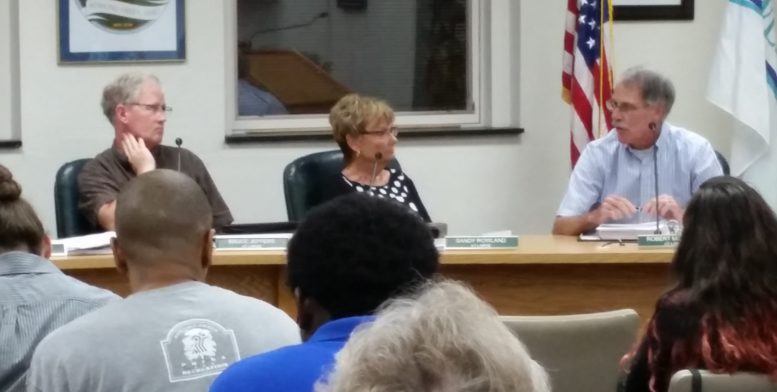By JAN LARSON McLAUGHLIN
BG Independent News
Just as the environmentalists don’t believe pipelines belong near the city’s water treatment plant, a Bowling Green City Council member doesn’t believe the proposed anti-pipeline charter amendment belongs in the city’s “pristine” charter.
The anti-pipeline charter amendment remains in legal limbo – but just in case it’s cleared for the ballot in November, council member Bob McOmber cautioned about the language that may be inserted into the city’s charter.
The proposed charter amendment is very difficult to understand, he said. And the portions McOmber does understand, he finds “highly objectionable.”
“It’s inappropriate to insert that cause into the city charter,” he said during Monday’s council meeting.
McOmber said the local residents behind the anti-pipeline charter amendment are a special interest group. While there is nothing inherently wrong with special interest groups, their views don’t belong in the city’s charter.
“The proposal puts the cause of one special interest in the charter,” he said. The city’s charter is “pristine,” and has always been reserved for the mechanisms of city government.
“I think it would be a mistake to insert special interests in the city charter,” he said.
McOmber referred to the inflated Ohio constitution that has been allowed to grow into a “complete mess and embarrassment.”
McOmber mentioned the successful anti-discrimination ordinances adopted by citizens a few years ago. That effort went through council to help with the drafting and adopting of the ordinances.
“That is so much more appropriate,” he said. “This would be a mistake for the city.”
McOmber, who is not running for re-election, suggested that prior to the election every council candidate should state their opinion on the proposed charter amendment.
“The citizenry deserves to know where people stand,” he said. “My position is steadfast and will not change.”
Even if the charter amendment did get on the ballot, and did get passed by voters, it would not stop the Nexus pipeline, McOmber said.
“This is not going to make one iota of difference,” he said. “Federal law is heavily weighted against them.”
Council member Bruce Jeffers said that the environmentalists pushing for the charter amendment have already made a difference. They may not be successful changing the path of the pipeline, but their efforts led council to refuse an easement to the pipeline company, he said.
“That sort of gave us time to think it through a little more,” Jeffers said. Mayor Dick Edwards contacted the Ohio EPA and Federal Energy Regulatory Commission, and demanded answers to concerns about the city’s water plant.
The most recent communication from Ohio EPA Director Craig Butler guarantees strict oversight of the pipeline construction near the water plant.
“I think that’s a really good thing,” Jeffers said. “We are better off because of the activity of our local environmentalists.”
McOmber agreed that Edwards has done an “amazing” job of getting Ohio EPA and elected officials to listen to the city’s concerns.
Council president Mike Aspacher recommended that council members and citizens reread the city’s charter, adding it is “very crucial to the operation of city government.”
Earlier in the meeting, Brad Holmes and Lisa Kochheiser, who have led the anti-pipeline charter amendment process, talked about the most recent challenge to getting the issue on the November ballot. A hearing was held last week after a protest was filed by a Bowling Green citizen, David W. Espen, to keep the issue off the ballot. The board of elections has taken his complaints about adequate signatures and constitutionality into consideration.
“We’re still waiting for the board of elections to make a decision,” Kochheiser said. “The voters of Bowling Green have a right to protect our community.”
Holmes mentioned that the village of Waterville recently used its newly passed charter initiative to try to stop the Nexus pipeline in that community. That initiative is similar to the Bowling Green proposal, he said, demanding “community rights to a livable environment.”
Edwards, however, pointed out that the Nexus pipeline is not proposed within the city of Bowling Green, but rather close to the city water plant which is in Middleton Township.
The mayor noted the Ohio EPA’s letter addressed the city concerns about the Bowling Green Fault, the presence of Karst features, inadvertent returns from the drilling process, potential effects of the installation on the city’s reservoir, the effect of blasting on pipeline integrity, and project oversight.
The Ohio EPA has learned a lot from the environmental issues caused by the Rover pipeline installation, Edwards said. The EPA promised “aggressive” monitoring and oversight, and agreed to give contingency and response plans to the city’s public utilities director.
Aspacher said Ohio EPA Director Craig Butler addressed each of the city’s concerns. “I personally was impressed with the level of detail to which Director Butler spoke.”





